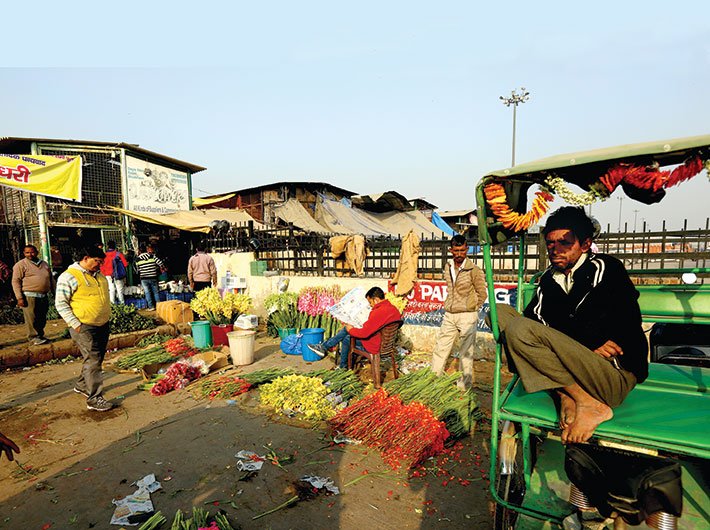It’s on the small towns and villages, on the mandis and the small-scale units that demonetisation inflicted its worst cuts. From these places emerge many grim tales
Winter mist hangs over Johra, a village of 928 people situated on the Ganga canal, 50 km east of New Delhi, in Ghaziabad. It is colder here than in Muradnagar, the nearest town, on the Delhi-Meerut highway, from where the road forks to the village, located at the 12th kilometre. It’s a calm setting, typical of villages here. But a peep into the lives of people here reveals a tumult of emotions and hardships that the currency ban has thrown them into.
Shehnaz Saifi, 36, and her carpenter husband Salman are wondering where the next meal for the family would come from. Shahnaz’s motor-operated sewing machine is lying dormant in the sunny courtyard outside their one-room dwelling. A bundle of black track-pants lies on the coir string charpoy nearby. Some six months ago, Shehnaz had taken the hard decision of becoming a working woman. The expenses of her school- and college-going children – three sons and a daughter – were increasing and Salman’s income was too little and erratic. So, one day she took a loan of Rs 30,000 from the local office of a Bengaluru-based chit fund company to buy the sewing machine.
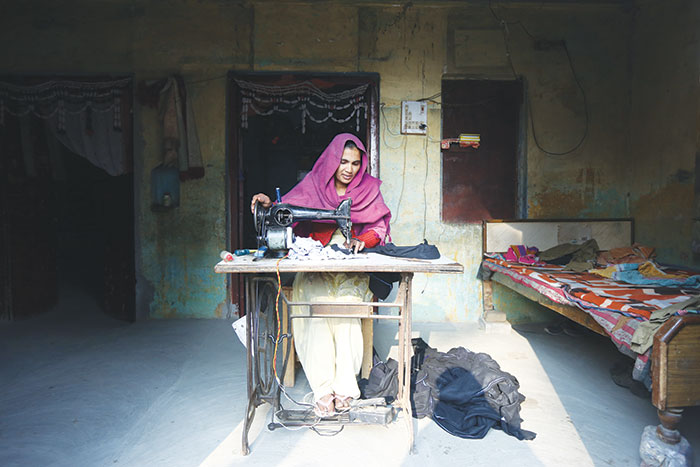
(Shehnaz Saifi at work: a pile of half-stitched garments lies on the floor of her home Shehnaz Saifi at work: a pile of half-stitched garments lies on the floor of her home)
“I went to the garment factory in Muradnagar and received training for 15 days. I would sit with the tailors and observe them work,” says Shehnaz. Thereafter, a contractor, who had bagged a major order from the factory, would deliver the material and a set of instructions for stitching to her and pick the finished products from her home. Shehnaz was earning a steady income of Rs 5,000-6,000 per month. It made a big difference. For the first time in her life, she says, she didn’t have to ask for money from Salman to buy food that her children liked. “I could see happy faces of my children at meal times. Roz-roz ki khichkhich band ho gayi thi (Our constant bickering had ended).”
Life was getting better for Shehnaz, till one day, a co-worker at a local farmer’s field, where she was harvesting paddy along with women belonging to other landless families, told her about the “notebandi” – that’s the popular term for demonetisation. “I didn’t think much of it back then,” she says. As she had an amount of Rs 4,500 in 500 and 1,000 denominations with her, she went to the bank branch in Niwari, about 2 km away, to deposit and exchange it. “I could manage to do it after standing in the queue for three consecutive days.”
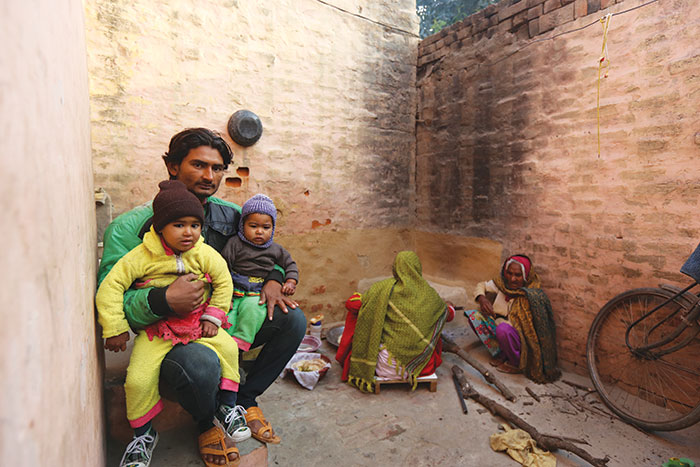
(Nazim Ansari with his family at Johra)
Soon, she noticed that Salman was no longer going for work. He told her that most of the people planning woodwork had put off their plans due to the acute cash crunch post demonetisation. A few days later, the contractor of the mill came and gave her another piece of bad news. “The garment mill is closing down since the big buyers have cancelled all orders due to notebandi,” he told her and Shehnaz’s world came crumbling down. The ‘contractor’ told her to keep all the stitched and unstitched garments with her and not expect remuneration very soon.
“I have lost the ability to think,” she says, showing us the half-done track suits. While we are talking with Shehnaz, two young men with sling bags are waiting to speak to her. They are employees of the chit fund company. One of them tells us that almost all adults in Johra have taken a loan from his company at an interest rate of 1.5 percent a month. “We know that right now all of them are hard-pressed for money, but it’s my responsibility to come and remind them about the pending EMI payment,” he said. Shehnaz says she has no idea how she will pay the EMI of Rs 2,110, not to mention clearing the loan eventually.
“I get to hear that the poor like us may get some relief after 50 days (of demonetisation),” Shehnaz says and without waiting for a response, continues, “It looks unlikely. I wish, instead, they (the government) had allowed us to carry on with our lives.”
150 families have no food to eat…
Her neighbour Nazim Ansari, a small-built man in his forties, says that because of ‘notebandi’, he has lost a business opportunity. He was in the business of supplying tandoors, or mud-lined Indian ovens, for weddings and other mega events. Ansari says that during the wedding season (which this year coincided with the demonetisation announcement), he would usually earn Rs 20,000 per wedding. But the day after the ban, most of the wedding parties and big events were cancelled, forcing him to look at another option. He is now hawking vegetables on a pushcart and makes about Rs 100 a day.

(Jeet Singh Choudhary in his field)
Ansari’s troubles are only mounting. Each day he has visitors at home – the ‘karigars’ – skilled labourers whom he had employed as cooks to tend to the tandoors. He hasn’t paid them wages. “I have to get money from the wedding planners and event managers to be able to pay 50 of them. They are asking me to wait for some more time or till the troubles from ‘notebandi’ are over,” he says. At Johra, the ripple effect of the cash crunch on the economy is too brazen and glaring to go unnoticed. “I can tell you that there are 150 families in this village who do not have food to eat,” claims Ansari, who is surrounded by men with worry writ large on their faces. Almost everyone has a similar story to tell us.
Farmer has no say; his life is controlled by others
In Johra, the landowners are facing the demonetisation aftermath with characteristic stoicism. Jeet Singh Choudhary, a middle-aged farmer, owns 35 bigha (approximately 14 acres) on which his family grows wheat and sugarcane. Two of his sons and their families are dependent on the income from their share of the field, while for his third son, who is in the police, the farm income supplements his earnings from the job. “One of my grandsons is in the army,” Jeet Singh says proudly.
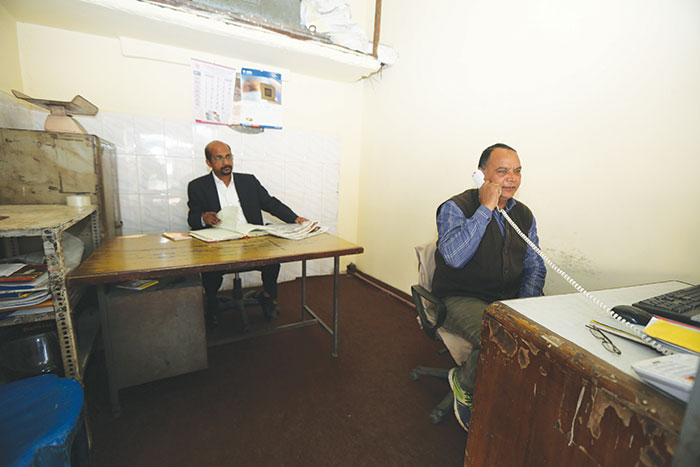
(Mathew Jose (left) and Vinod Kumar at their Ghaziabad office)
Walking along the tall standing sugarcane crop on his field, Jeet Singh says the “notebandi” had happened when the farmers were getting ready to sow wheat and mustard. They borrowed seeds from one another and bought fertilisers on credit – with the kisan credit cards and from traders – to save whatever little cash they had. “None of us stood outside banks for cash for we had no cash to deposit or withdraw,” he says in a raised voice. “The government does not care about us and the lala (the term used by the farmers for the middlemen, big traders and hoarders who buy their produce) decides the price of our crop,” says Jeet Singh, who finally gives up the pretence of being calm amidst the notebandi turmoil.
However, sarcasm apart, with each passing day, Choudhary and his clan are getting more disturbing news about farmers’ losses due to demonetisation. The prices of vegetables have crashed in the market, as the consumer has no cash, so the demand is low and ultimately it is the farmer who has to bear heavy losses. Jeet Singh makes a prediction: the low prices of agriculture produce would continue till the time comes to harvest the crop and take it to the mandis, around April. “The lalas will make sure that they buy our wheat at throwaway prices,” he sighs.
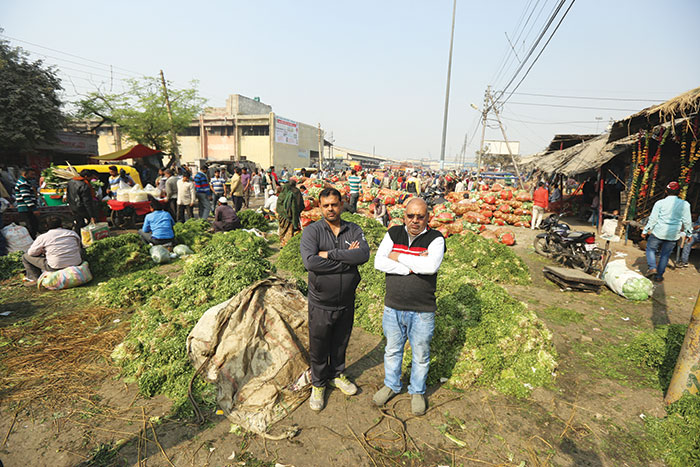
(Yoginder Singh Rawat and his friend Deepak Sharma looking at the near deserted Sahibabad Mandi, Ghaziabad)
“The farmer has no say,” says Jeet Singh. “His life is controlled by others – the government and the lala.”
He further explains the situation. “The state government has not paid us our dues for sugarcane for three years and when they pay, it’s a paltry amount which goes into meeting routine expenses and paying interest on loans taken under the kisan credit card,” he says.
When prime minister Narendra Modi was making the demonetisation announcement on television, hectic preparations were going on in two families for the wedding of their daughter. “Marrying off a daughter is treated as a common responsibility by us, so we have to arrange cash for both the families,” says Jouni Choudhary, a polio-stricken man, who is identified as ‘social worker’ by villagers. Jouni says he organised a group of 20 local youth and asked them to stand in queues at various nearby bank branches to withdraw cash. “This is how we helped the two families and saved the villagers from facing an embarrassing situation,” he says.
Unable to make sense of Modi’s demonetisation – its ostensible objective is to weed out black money and strengthen the economy on the whole, villagers wonder how 11 aspirants for sarpanch’s post are able to meet expenses of running their personal vehicles – to seek public support – in Johra and surrounding villages the whole day. “Why doesn’t Modi question them?” asks Jouni.
Where have all the working girls disappeared?
On November 8, a Tuesday, Vinod Kumar had spent the day planting the cuttings of sugarcane in his field in Johra. It was his day off from his job at Madhur Couriers, Ghaziabad. He retired early, as his wife and daughters were watching a drama serial on television. “As such, nobody is keen to listen to the TV news in the villages,” he says, explaining why he had missed out on the big bang demonetisation announced by Modi. The next morning, he left for his work place, 30 km away, on his motorcycle and stopped at the gas station for refuelling. When he offered Rs 500 note for fuel, the petrol pump attendant’s terse announcement startled him: “Yeh note nahin chalegi, yeh band ho gaya hai (This note is not valid; it has been banned).”
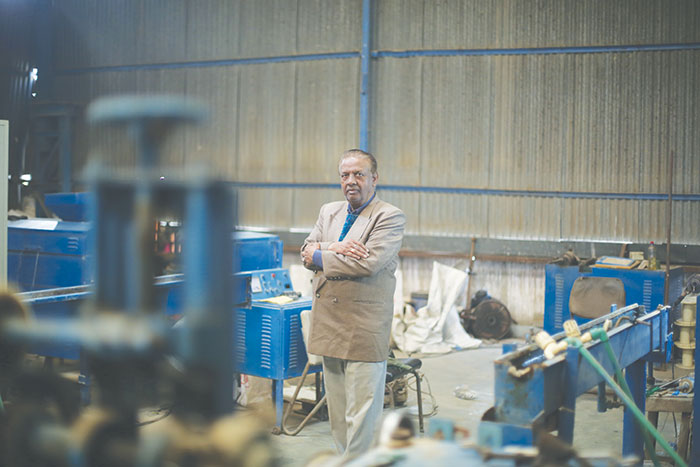
(Hari Om Gupta inside his half closed plant at Udyog Kunj, Ghaziabad)
“At first, I didn’t understand the meaning of what he was saying,” said the 46-year-old. Ultimately, he had to borrow money from a shopkeeper to pay for the fuel. “I never realised what it would mean for me and my family; not least that it would leave me workless and my co-workers jobless.”
At Madhur Couriers, the owner, Mathew Jose, was waiting for his most trusted employee of 20 years to share his anger and anguish with. A native of Kozhikode, Kerala, Jose, had opened this office after losing interest in his job with a leading pharmaceutical company 25 years ago. Banging the sunmica-topped desk that bore the marks of years of wear and tear, Jose said, “I came to the city empty-handed and built my life from this very desk.”
Demonetisation has come as a major setback to his business of running bulk courier service for banks and other institutions. As such, he said, the austerity drive of banks and the emergence of big courier companies in smaller towns had dealt a big blow to smaller players like him even before the ‘notebandi’ was announced.
Driven by the passion to become an independent businessman, Jose had started by delivering couriers from Ghaziabad to Delhi on his bicycle. Soon, his hard work paid off and business grew, enabling him to hire more hands. “In 2014, I had 22 employees. I also paid Diwali bonus to them; I was in the middle of expanding business to other towns,” says Jose, who lives with his wife and two college-going sons in Indirapuram, Ghaziabad.
“Today I am feeling so bad that, for the first time, I have not been able to pay salary to Vinod, who is my right-hand man,” he says. Apart from the cash crunch, demonetisation has also meant a drastic fall in Jose’s business. Last month, he took a tough decision to lay off three of his seven employees, including a woman. “I felt so bad to tell them that I can no longer afford their services.” He says he felt particularly bad for the woman employee, who was hard working and honest.
“She left for Bihar immediately,” he says. Likewise, Jose says, since the demonetisation, he does not see the group of young women from small towns like Muradnagar and Modinagar alighting from public transport vehicles and walking to their workplaces in Ghaziabad each morning. “They all must have also lost their jobs.”
Apart from institutional bookings, Vinod, who sits in the Madhur Couriers office, used to book parcels from retail clients to the tune of '1,000 a day. “Now, I hardly book for Rs 100 or 200, and some days there is no business at all; I keep sitting the whole day,” says Vinod. Since banks are busy handling demonetisation, their dealings with Madhur Couriers have come down. “My business is down by 80 percent,” he says. He is mulling of scaling it down further.
His company’s account is with UP Sahakari Bank, which, like all cooperative banks, was barred from exchanging or depositing banned currency notes till recently. “The cash crunch hit me hard as I didn’t know where to get the money for meeting the routine expenses of running an office,” he says.
“For us, business is not only about making money; one builds bonds and relations in the process,” says Jose as he goes down memory lane. He remembers how Vinod’s father had asked him to keep his young son away from the village. “His only idea of getting his son into a job was to keep him away from the squabbling village boys.” He says everyone in the market loves and trusts him. “I can tell you that everyone out here is living with uncertainty.”
Vinod’s anxiety is also growing. “Business is so down that it scares me to think about my future.” The delay in salary has forced him to start getting home-cooked food for lunch. “I can no longer afford to spend Rs 20 at an eatery for my food now,” he says.
Game of thorns in the flower market
The prices of vegetables in Delhi NCR have fallen to unbelievable levels, making cash-strapped consumers feel a bit relieved. However, the ripple effect of this has swept a lot of people off balance – arhatiyas (commission agents at wholesale markets of vegetables, fruits and flowers), small traders, vendors, labourers and all those who lived off the farm trade. But more importantly, it has affected farmers the most as we found out after visiting the wholesale markets of agriculture products in Ghaziabad.
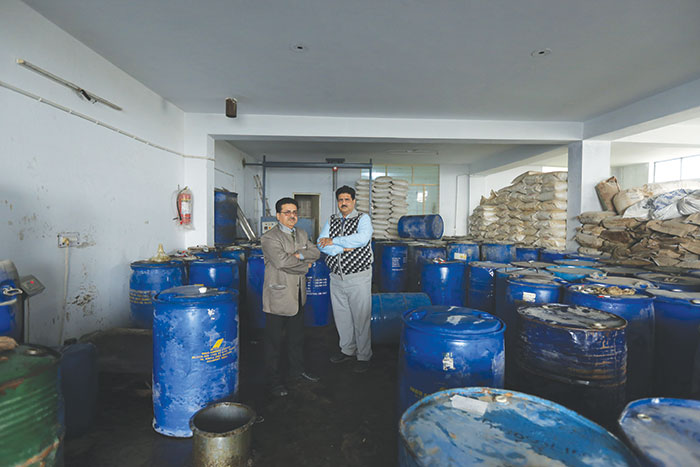
(BK Gupta and Umesh Gupta inside their factory at Udyog Kunj, Ghaziabad)
It’s early morning at the Sahibabad fruit and vegetable mandi, Ghaziabad. Yoginder Singh Rawat is standing next to the mini van which has carried 160 jute sacks filled with peas from Punjab for him to sell. Hailing from Uttarakhand, Rawat has been an arhatiya dealing in fruits and vegetables at the mandi for 25 years. Never before had he seen such a long spell of losses. He’s selling peas to retailers for Rs 10 a kilo after purchasing them for Rs 8 in the Amritsar mandi. Besides, he has to pay Rs 6 for loading and unloading and freight charge of Rs 3.6 per sack and 2.5 percent tax at the mandi. This makes selling peas a loss-making proposition.
“I hope the situation improves in coming days,” says a worried-looking Rawat, who, like many of his peers, fully supports Modi. “I am sure he has something good for the nation in his mind. We have to make sacrifices for India’s progress.” He frequently repeats these and similar remarks during our conversation.
However, coming to business, Rawat wishes the situation gets normal at least after the 50 days, or at least by April, when he hopes to make good money in the lucrative business of watermelons. “It’s a three-month business starting in April; and last year, I sold watermelons for Rs 3 crore.”
All the fruits have gone sour and veggies come cheap
Wholesalers like Rawat say the cash crunch has dented people’s purchasing power leading to a drastic fall in prices of vegetables and fruits. Small vendors are unable to handle digital money. “I used to sell the same peas for Rs 20 a kilo earlier.” Besides, he says, consumers are simply avoiding buying fruits – bringing this part of his business to a near standstill.
Flowers, another cash crop for progressive farmers of Himachal Pradesh, Ooty, Kodaikanal and other places, are selling at unbelievably low prices at Ghazipur flower mandi, close to Ghaziabad. Shehzaad, an arhatiya who has been in the business for 18 years, says the flower market in the NCR is down by a staggering 80 percent. “I don’t think it will ever recover,” says Shehzad, who believes black money was driving the flower offtake for glitzy social and political dos in the capital. “No city splurges on flowers and decoration as much as Delhi people do.”
On the first day of demonetisation, half of his orders were cancelled. “Nowadays the wedding functions have started looking like birthdays parties.” He says the move will affect two kinds of people – the wedding planners, banquet hall owners, decorators, hoteliers and event managers and on the other hand, a chain of suppliers, retailers, skilled labourers, head-load workers, truckers, rehriwalla, and most importantly, the flower growers.
In a wedding season, this mandi would see flowers worth Rs 2 crore changing hands in a day. Today, the figure has come down to about Rs 5 lakh per day. Shehzad’s daily sales are down from Rs 70,000 ‑ Rs 1 lakh to Rs 10,000-15,000. “One just does not know where to cut expenses.”
Besides, mandis are dynamic places where farm produce worth crores of rupees changes hands daily, offering livelihoods to hundreds of people – head-load workers, small-time decorators, chaiwalla, polythene bag sellers, women making garlands, rehriwalls and so on. Idrees, a labourer, says his monthly earnings at the Sahibabad mandi have come down from Rs 8,000-9,000 to Rs 2,000. “I can’t support my family on this,” he says haplessly.
Big traders like Rawat are already contemplating how to make up for the losses in coming days. “Loss and gain is part of our business,” says Deepak Sharma, who works with Rawat at the Sahibabad mandi. He confides that arhatiyas like him will one day manage to recover the losses they are making due to demonetisation since they have the capacity to stay on. It’s the farmer, he adds candidly, who is suffering huge losses right now and it’s again the farmer who will not have the wherewithal to make up the losses later.
For example, the peas that Rawat has bought from the Amritsar mandi for Rs 8 a kilo must have been sold by the farmer for Rs 5, but it would have fetched the farmer Rs 10 to 12 a kilo if there were no currency blues. Similarly, he says, the farmers of Himachal Pradesh, the closest flower growing state, are livid at what demonetisation has caused. “Himachal ka kisan ro raha hai (The farmers in Himachal are crying),” he says. The fall in flower prices is a major setback to them and cultivators in other places.
Gloom on industrial belt
Hari Om Gupta believes that the government’s move to change currency and tighten controls on people’s personal finances may be well-intentioned but it will never end the vicious cycle of corruption in India. Corruption is a deeper malaise that can’t be controlled by withdrawing currency, says the cable and wires manufacturer. “From my experience, I can tell you that one has to pay a bribe to officials at every industry-government interface, like the labour commissioner’s office, excise office or VAT office, or they will send you inflated bills and notices, which take time, money and attention to settle in the courts,” says Gupta, an engineer-turned-entrepreneur.
Sitting in front of his cable manufacturing unit, KM Cables in Udyog Kunj on NH 24, a hub of small and medium enterprises in Ghaziabad, Gupta says he had never seen such a slump in the business in the ten years of his career as an entrepreneur.
“I faced the first impact of demonetisation on November 15, when my buyers cancelled their orders. They said the demand in the market was low.” His clients are big players like Havells India, Halonix and Oriental Electricals. In the 50 days, the production in Gupta’s unit has come down to 25 percent. He has already laid off eight of his 15 employees. “It’s for the first time that I had to tell the staff to go home since I can’t pay their salaries till the situation improves,” he says.
Gloom prevails all over the Udyog Kunj, a vast expanse of industrial sheds housing small and medium scale industries, as machines have gone silent and lay-offs in production units have made them look like haunted places. “Generally everyone has laid off 50 to 75 percent of manpower since one does not know that how long the woes on account of cash crunch and low demand for products will continue,” says Gupta, whose company had an annual turnover of Rs 5 to 8 crore.
He also admits that if the situation does not improve after the promised 50 days, it’ll get difficult for the smaller and medium businesses to survive. Ultimately, the big fish will come and eat the smaller one which is not good for the SME sector, he feels.
“Life was good as I had no dearth of buyers for wires and cables. Also, I had no serious competitors since I was manufacturing quality products,” he says. The future, for the moment, looks grim, he says. “Modi will either become a hero or turn out to be a big zero,” was his parting shot.
Cash-only is good business policy too
Amidst the gloom and despondency, Gupta brothers – Umesh and BK (as the older one prefers to be called) – can give a tip or two to others on how to survive during the adversity that has befallen the manufacturing community post demonetisation.
One should have a long-term vision, says BK Gupta, a polymer engineer who had helped his younger brother Umesh set up the UB Detsurf Industries, where chemicals used for fertilisers and other agrichemicals are manufactured. Gupta, a technical consultant to UB, says his experience of working with a US company had taught him to have transparent financial dealings if you want your gains to be sustainable.
“Honestly, our work is not affected by demonetisation,” says BK. The reason, he says, is that the company had always done legal business. “We get offers of several crores for accepting payments in cash,” he says. “We never accept cash in any form because most of the cash in India is black money.”
The only dealing they have in cash is with the chaiwalla outside the office. “I have told him that we will open his account in the bank and money will be transferred into his account,” says Umesh, director of the company.
They have constructed one-room accommodations for the staff on the factory’s top floor, so that they don’t have to waste money, time and energy in commuting and on rentals.
However, the Guptas admit that while their production has so far remained untouched by demonetisation woes, they also fear that if the agricultural production goes down or the market sentiment does not improve, they could also face the monetary blues.
“Ultimately, all manufacturing and economy is interlinked in today’s world,” says BK. He feels that demonetisation was a good move but its execution was heavily flawed.
aasha@governancenow.com
(The story appears in the January 1-15, 2017 issue)

